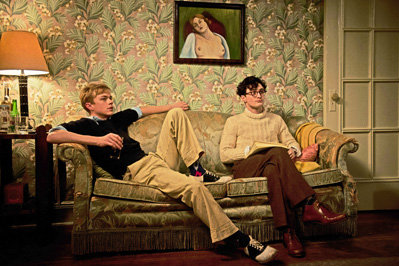“Rupture the pattern” and “break the law” are ideologies that animate the neophyte Beats — Lucien Carr (Dane DeHaan), Allen Ginsberg (Daniel Radcliffe), William S. Burroughs (Ben Foster) and Jack Kerouac (Jack Huston) — in the ambitious “Kill Your Darlings,” opening Nov. 8 at Ritz Theatres.
Director and co-writer John Krokidas certainly ruptures patterns and breaks rules telling this beguiling story set in the mid-1940s. Recounting the murder of David Kammerer (Michael C. Hall), the filmmaker uses contemporary music (TV on the Radio) and film snippets played back in reverse. But, Krokidas is more interested in creating mood than verisimilitude, even if “Kill Your Darlings” is based on a true story.
Audiences may be impressed by some of the fanciful “dream” sequences, but this film, often trying too hard, has more wrong with it than right. It’s amusing to see David Cross — who played Ginsberg in “I’m Not There” — play Ginsberg’s father here, but Radcliffe seems miscast. The young actor is too slight and scared as the poet, hiding behind his glasses rather than looking through them at the big new world, drinking it in and forming real thoughts about it like Ginsberg probably did. His Ginsberg transforms from meek to empowered over the course of the film, but Radcliffe’s performance never quite convinces.
Likewise, the character of Lucien Carr, who makes a naughty entrance at the Columbia University Library, is not a particularly seductive coconspirator. As DeHaan plays Carr, he comes across as less “outrageous” than bipolar.
Still, Ginsberg falls under Carr’s spell and follows his new friend down to “the land of the fairies” — as Greenwich Village is referred to by Ginsberg’s roommate — to break free of tradition and conformity. At a party hosted by Kammerer, Carr’s lover and college-paper ghostwriter Ginsberg meets William S. Burroughs, who is lying in a bathtub inhaling nitrous oxide. (Foster gives an irresistibly droll performance as Burroughs.) The new friends make plans to kill off the old guard and create anew, staging a mock suicide and fueling their dreams with Benzedrine.
“Kill Your Darlings” gets the seed of the Beat movement right — the railing against convention — and there is a bit of life in the film when the characters must define themselves against prevailing expectations. When Ginsberg questions rhyme and meter, form and tradition in his Columbia poetry class or reads a poem he wrote to Carr and Kerouac while sitting in a boat, the film does enthrall.
But then there is a leaden sequence of Ginsberg distracting a comely female librarian with the promise of sex so Carr and Burroughs can pull off a prank displaying censored material throughout the library. The scene’s narrative importance — that this is the characters’ rebellion against authority — is not lost, but the break-in doesn’t amount to much fun.
Nor is the romantic tension between Carr and Ginsberg especially sexy. A scene in which Ginsberg imagines Carr sucking on his finger is far more compelling than a kiss the two later share. When Ginsberg stares longingly at Carr as the librarian orally services the future poet, there should be sparks. Instead, it just looks awkward.
Carr’s appeal is best expressed in his ability to motivate Ginsberg to develop self-worth and challenge convention. But Krokidas too frequently insists on using a cudgel to make the point, most egregiously in a montage that crosscuts among three forms of penetration — Kammerer being knifed by Carr, Burroughs injecting drugs and Ginsberg having anal sex.
Kammerer’s murder could have been given greater emphasis. While his stalking behavior comes across as a nuisance to Carr — and, by extension, Ginsberg — and the depth of Carr’s affection for him is in doubt, the suggestion that they do him in seems extreme. After Carr kills Kammerer, the film wrestles briefly with Ginsberg’s quandary over whether to help him mount his “honor-slaying” defense — where the sexual orientation of the victim and attacker are critical — but the issue turns melodramatic when he takes up his qualms with his institutionalized mother (Jennifer Jason Leigh).
All of which diminishes the climax of a film intended to help us understand young men eager to make their mark. In the end, the impression they leave is unsatisfying.

